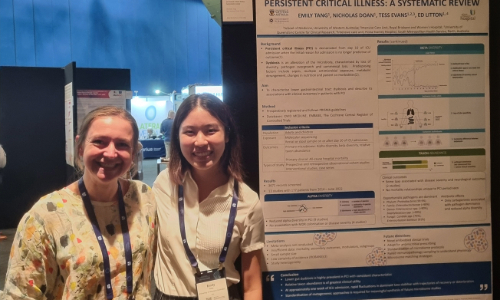Microbial Mayhem: the impact of persistent critical illness
Hi everyone! We’re a team of clinician researchers from The University of Western Australia and The University of Queensland, and we’re interested in all things microbiome in critical illness. We published clinical trials of intensive care unit (ICU) probiotic therapy and curated an active biobank of more than 6000 ICU rectal swab samples undergoing metagenomic analysis.

Our systematic review delves into the gut microbial dynamics of one of our most vulnerable hospital cohorts, those with persistent critical illness (PCI). These patients still require organ support after 10 days in the ICU and are at high risk of adverse outcomes.
Microbiome-based interventions in the precision medicine paradigm have become promising therapies in critical illness. Our systematic review emerged from a need to better understand stark microbial disturbances amongst individuals with PCI to inform translational therapies.
A key finding is that lower gut microbial disruption is highly prevalent in PCI. Consistent characteristics include reduced diversity, pathogenic enrichment, commensal depletion and fluctuations in dominant taxa over days. This state of severely reduced ecological stability may be responsive to microbiome-based interventions.
We found that these rapid fluctuations in dominant taxa appear to stabilize with trajectories of either recovery or deterioration after approximately one week of ICU admission. This has parallels to clinical trajectories observed in ICU with PCI defined as the time when chronic comorbidities have a greater influence on outcome than the cause of ICU admission. The timing also aligns with an observed increase in antimicrobial resistance development in the ICU.
While the underlying mechanisms for divergent microbiome trajectories require further study, our findings may have meaningful implications for time-critical interventions such as prognostic marker utilization, microbiome-based therapies and antibiotic stewardship.
As in our systematic review of the acutely critically ill(1), we see value in microbiome indices for prognostication and found that relative taxon abundance may be of greatest utility compared to broader ecological measures such as alpha diversity.
During the synthesis of our systematic review, heterogeneity at each step of the metagenomic pipeline posed a significant challenge and we add to calls for standardisation of methods and reporting in microbiome studies.
We aim to address these challenges through our ICU clinically embedded Prospective Observational Embedded Microbiome Study (POEMS) research platform, which leverages usual-care rectal swabs to support ecological and clinical studies on structural microbial dynamics, disease-specific signatures, exposures of interest, and public health priorities such as antimicrobial resistance.
The insights from this systematic review, combined with the POEMS platform, pave the way for innovative trials to improve patient-important outcomes. One such trial is the world-first ROCIT-FMT trial (ACTRN12624000034538), which aims to restore gut microbiota with faecal microbiota transplantation in PCI. Together, these efforts hold the promise of transforming therapeutic options for patients with critical illness.
1. Evans T, Ali U, Anderton R, Raby E, Manning L, Litton E. Lower gut dysbiosis and mortality in acute critical illness: a systematic review and meta-analysis. Intensive Care Medicine Experimental. 2023 2023/02/03;11(1):6. doi:10.1186/s40635-022-00486-z.
Image: iStock/ChrisChrisW
